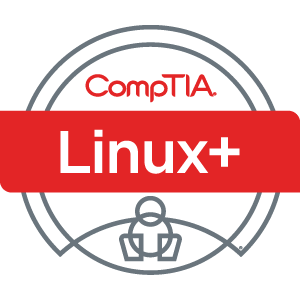
CompTIA Linux+ is a certification designed for IT professionals who work with the Linux operating system. It validates the skills and knowledge required to be a successful Linux administrator, covering various aspects such as system architecture, installation, package management, GNU and Unix commands, devices, file systems, shells, scripting, and security.
Duration: 5 Days
$2,295.00
The CompTIA Linux+ certification is designed for IT professionals who work with Linux-based systems. The target audience includes:
Overall, the CompTIA Linux+ certification caters to a diverse audience, ranging from beginners to experienced professionals, who work with or plan to work with Linux-based systems in various capacities within the IT industry.
The objectives of the CompTIA Linux+ certification cover a wide range of topics related to Linux system administration. These objectives are designed to assess candidates’ knowledge and skills in various areas of Linux administration.
The CompTIA Linux+ certification offers several benefits for IT professionals looking to validate their skills and advance their careers in Linux system administration:
Overall, obtaining CompTIA Linux+ certification offers a range of benefits that can boost your career prospects, increase your earning potential, and provide you with the skills and knowledge needed to excel in Linux system administration roles.
The Linux+ certification does not have any strict prerequisites. However, 12 months of hands-on experience working with Linux servers is recommended. Earning the CompTIA A+, Network+ and Server+ are also recommended.
While having prior experience and knowledge in the above areas can be advantageous, CompTIA Linux+ certification is designed to be accessible to individuals with varying levels of experience, including beginners. Therefore, even if you don’t meet all of the recommended prerequisites, you can still pursue the certification by dedicating time and effort to study and practice the relevant topics covered in the exam objectives.
CompTIA Linux+ is a certification designed for IT professionals who work with the Linux operating system. It validates the skills and knowledge required to be a successful Linux administrator, covering various aspects such as system architecture, installation, package management, GNU and Unix commands, devices, file systems, shells, scripting, and security.
The CompTIA Linux+ certification is designed for IT professionals who work with Linux-based systems. The target audience includes:
System Administrators: Individuals responsible for installing, configuring, and maintaining Linux servers and systems in corporate environments.
Network Administrators: Professionals managing network infrastructure that includes Linux-based devices and servers.
IT Support Specialists: Those providing technical support for Linux systems, troubleshooting issues, and assisting end-users with Linux-related problems.
DevOps Engineers: Developers and operations professionals who work with Linux as part of their continuous integration, continuous deployment (CI/CD), automation, and infrastructure management processes.
Security Specialists: Professionals involved in securing Linux-based systems, implementing security measures, and performing security audits.
Students and Aspiring IT Professionals: Individuals seeking to enter the IT industry or advance their careers by gaining foundational knowledge and skills in Linux administration.
Experienced Linux Users: Individuals with experience using Linux who want to formalize their skills, fill in knowledge gaps, and obtain industry-recognized certification.
Career Changers: Individuals transitioning from other IT roles or fields into Linux administration and seeking to validate their skills through certification.
Overall, the CompTIA Linux+ certification caters to a diverse audience, ranging from beginners to experienced professionals, who work with or plan to work with Linux-based systems in various capacities within the IT industry.
The objectives of the CompTIA Linux+ certification cover a wide range of topics related to Linux system administration. These objectives are designed to assess candidates’ knowledge and skills in various areas of Linux administration.
The CompTIA Linux+ certification offers several benefits for IT professionals looking to validate their skills and advance their careers in Linux system administration:
Industry Recognition: CompTIA certifications are well-recognized in the IT industry, and achieving Linux+ certification demonstrates proficiency in Linux administration, enhancing your credibility and marketability to potential employers.
Validation of Skills: By passing the Linux+ exam, you validate your knowledge and skills in various areas of Linux system administration, including installation, configuration, maintenance, troubleshooting, and security.
Career Advancement: Linux+ certification opens up new career opportunities in roles such as Linux system administrator, network administrator, DevOps engineer, and IT support specialist. It can also lead to higher-paying positions within organizations that rely on Linux-based systems.
Increased Job Opportunities: Many employers specifically look for candidates with Linux certification when hiring for IT positions, especially in organizations that use Linux extensively in their infrastructure.
Hands-on Experience: While preparing for the Linux+ exam, candidates gain valuable hands-on experience working with Linux systems, which is essential for success in real-world IT environments.
Continuous Learning and Development: CompTIA certifications require candidates to stay updated with the latest technologies and best practices in Linux administration, encouraging continuous learning and professional development.
Global Recognition: CompTIA certifications are recognized globally, allowing certified professionals to pursue job opportunities not only in their home country but also in other regions around the world.
Membership Benefits: CompTIA Linux+ certification holders may also gain access to CompTIA’s online community, networking events, and other resources that can further support their professional growth and development.
Overall, obtaining CompTIA Linux+ certification offers a range of benefits that can boost your career prospects, increase your earning potential, and provide you with the skills and knowledge needed to excel in Linux system administration roles.
The Linux+ certification does not have any strict prerequisites. However, 12 months of hands-on experience working with Linux servers is recommended. Earning the CompTIA A+, Network+ and Server+ are also recommended.
Basic Computer Skills: Candidates should have a fundamental understanding of computer hardware, software, and operating systems.
Familiarity with Linux: While not mandatory, prior experience with Linux operating systems is highly recommended. Candidates should be comfortable working with Linux distributions, performing basic tasks, and navigating the command line interface.
Understanding of Networking: Basic knowledge of networking concepts such as IP addressing, subnetting, TCP/IP protocols, and network troubleshooting will be helpful, as networking is an important component of Linux administration.
Problem-Solving Skills: Linux administrators often encounter complex issues that require troubleshooting and problem-solving skills. Having a logical and analytical mindset is beneficial for resolving technical problems effectively.
While having prior experience and knowledge in the above areas can be advantageous, CompTIA Linux+ certification is designed to be accessible to individuals with varying levels of experience, including beginners. Therefore, even if you don’t meet all of the recommended prerequisites, you can still pursue the certification by dedicating time and effort to study and practice the relevant topics covered in the exam objectives.
5 days
$2,295.00
In just 7 days, you’ll discover your potential, elevate your confidence, and determine if you’re truly prepared to achieve certification, advancement, and reward—through an engaging self-assessment challenge crafted specifically for ambitious IT professionals.

@ Copyright SteppingStone Solutions, Inc. 2024-2025 All Rights Reserved